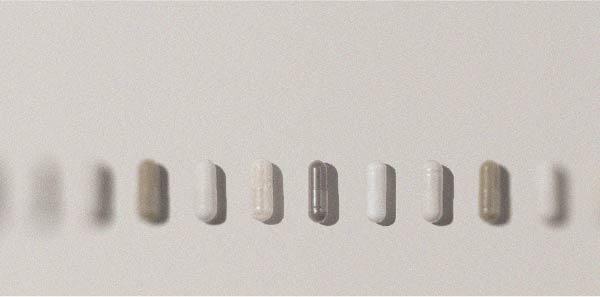What are the 7 best supplements for fighting fatigue?
Are you feeling increasingly tired and want to find a natural way of restoring your energy and well-being? Discover our top 7 supplements for fighting fatigue.

Recap: why do we get fatigued?
There are many potential causes of fatigue: sleep problems, an unhealthy diet, a sedentary lifestyle, stress, burnout … Very often, it’s a combination of several of these factors which produces the feeling of fatigue over the medium and long term: the body simply can’t keep up and rest alone is no longer enough to recharge your batteries!
While it’s entirely natural to feel tired after an exercise session or a particularly hard day at work, it is not normal for that tiredness to persist after a period of rest, or to be ongoing.
To help you regain your equilibrium, you may want to consider taking any of these 7 anti-fatigue supplements as soon as you feel the need.
Magnesium to help reduce fatigue
An essential trace-element, magnesium is involved in almost 300 of the body’s chemical reactions! Close to half our magnesium reserves are found in our bones and teeth.
Magnesium deficiency is relatively common, affecting almost 23% of women and 18% of men. Found in dark chocolate, pulses, whole grains and bananas, magnesium supports normal energy metabolism and helps to reduce fatigue (1) and maintain psychological function.
In terms of supplements, choose a form with good bioavailability such as magnesium malate, or magnesium citrate (contained, for example, in the product Multi Magnesium Formula).
Ginseng, the medicinal plant of vitality
Ginseng is one of the most popular medicinal plants in China where it has been used for thousands of years for its numerous beneficial properties. Considered an adaptogen like ashwagandha and rhodiola, ginseng supports the body when it becomes unbalanced.
In particular, ginseng helps to maintain vitality. The World Health Organization recently recognized as “clinically-established” the use of ginseng for “supporting physical and mental capacity in cases of fatigue, exhaustion, concentration problems and in those convalescing” (2).
Ginseng contains numerous beneficial elements including essential amino acids, minerals, and vitamins B, C and E. When it comes to supplements, try to choose one with a high content of ginsenosides (such as Ginseng 30%). Alternatively, you could take a synergistic formulation combining several adaptogen compounds.
Vitamin C for a welcome ‘shot in the arm’
Also known as ascorbic acid, vitamin C is essential to health, particularly for supporting the immune and nervous systems. It is also known to help reduce fatigue (3).
Good sources of vitamin C include peppers, chillies, and citrus fruit, as well as green vegetables such as spinach and cabbage.
To boost your intake, you can also take a dietary supplement (such as Triple C) to help support your body during periods of fatigue or when the seasons change.
Vitamin B12 and energy metabolism
Found in meat, poultry, fish and dairy products, vitamin B12 is often lacking in vegetarian and vegan diets, with supplementation recommended in such cases.
Vitamin B12 plays a number of roles in the body: it contributes to normal energy metabolism and nervous system function, and helps reduce fatigue (4).
The most effective form of vitamin B12 for the body is called methylcobalamin, a powerful coenzyme involved in many of the body’s reactions.
Aloe vera and its anti-fatigue properties
Known for its benefits for the skin and immunity as well as its anti-fatigue effects, aloe vera was widely used in traditional Chinese medicine, as well as in ancient Egypt and in India.
Aloe vera contains a number of nutrients such as A and B group vitamins, enzymes, polysaccharides, amino acids (5) and minerals.
In terms of supplementation, try to take aloe vera gel obtained from fresh leaves, preferably organically grown (such as Organic Aloe Vera).
Vitamin B3, to help restore your energy levels
Vitamin B3, with the alternative names of niacin or vitamin PP, also offers a host of benefits for supporting your body during periods of fatigue!
Vitamin B3 plays a role in the synthesis of enzymes involved in producing energy from the nutrients ingested via our daily diet. It helps to reduce fatigue and maintain normal psychological function (6).
Niacin is predominantly found in red meat, poultry, fish and vegetables. It can be taken in supplement form either on its ownNicotinamide Riboside Chloride, a rare and valuable form of B3) or combined with other active ingredients (such as GABA.
The absolute essentials: multivitamin supplements
To benefit from the potent synergistic effects of various minerals and vitamins effective against fatigue (magnesium, vitamin C, vitamin B3...), supplementing with a multivitamin can be invaluable in cases of deficiency or simply to help boost your daily intake – alongside a balanced diet, of course.
These supplements may also contain other active ingredients with complementary properties to help restore your well-being and equilibrium.
Choose a correctly-dosed supplement with highly-bioavailable compounds, also rich in natural extracts and phytonutrients, such as Daily 3® (or for even greater convenience, the one-tablet-a-day: Daily 1®).
References
- Red blood cell magnesium and chronic fatigue syndrome - The Lancet Volume 337, Issue 8744, 30 March 1991, Pages 757-760 - I.M.Cox M.J.Campbell PhD D.DowsonMB
- Anti-fatigue activity of the water-soluble polysaccharides isolated from Panax ginseng C. A. Meyer - Journal of Ethnopharmacology Volume 130, Issue 2, 20 July 2010, Pages 421-423 - Jia Wang Shanshan Li Yuying Fan Yan Chen Dan Liu Hairong Cheng Xiaoge Gao Yifa Zhou
- Cheraskin E, Ringsdorf WM Jr, Medford FH. Daily vitamin C consumption and fatigability. J Am Geriatr Soc. 1976 Mar;24(3):136-7. doi: 10.1111/j.1532-5415.1976.tb04284.x. PMID: 765389.
- Huijts M, Duits A, Staals J, van Oostenbrugge RJ. Association of vitamin B12 deficiency with fatigue and depression after lacunar stroke. PLoS One. 2012;7(1):e30519. doi: 10.1371/journal.pone.0030519. Epub 2012 Jan 20. PMID: 22276208; PMCID: PMC3262813.
- Putative Prophylaxes of Aloe Vera Juice with L-arginine to Chronic Fatigue Syndrome - Journal of Gastroenterology and Hepatology Research - Vol 5, No 2 (2016) - Akira Yagi, Suzuka Ataka.
- Blankfield A. Kynurenine Pathway Pathologies: do Nicotinamide and Other Pathway Co-Factors have a Therapeutic Role in Reduction of Symptom Severity, Including Chronic Fatigue Syndrome (CFS) and Fibromyalgia (FM). Int J Tryptophan Res. 2013;6(Suppl 1):39-45. Published 2013 Jul 21. doi:10.4137/IJTR.S11193
Keywords
3 Days
great products and prices
great products and prices
Marie
9 Days
Easy to navigate site
Easy to navigate site, had what I was searching for, good price. easy order-check out
James Tucker
15 Days
My skin is clearing up nicely!
Pretty good for my skin so far.
Christian
18 Days
The new packaging is excellent
The new packaging is excellent - finally! No more squashed boxes and torn envelopes.
GORAN
18 Days
Great Product
Great Product
Larry Garrett
23 Days
Quick shipping
Quick shipping; good price. No issues!
Mary McCarty
24 Days
Thr product is very good and is helping…
Thr product is very good and is helping me on my health. Then is always on time
LUGO Luz
27 Days
Buying was fine
Buying was fine. I had problems with the website not recognizing my login info, and had to call to get it fixed. Other than that, everything was good.
David S. Clark
27 Days
Your super maca and super ginseng are…phenomenal
Your super maca and super ginseng are phenomenal supplements that compliment each other when taking them together. Fantastic feeling of well-being and lots of mid day energy without the crash.
Keith Mason
30 Days
I have had amazing results with every…
I have had amazing results with every supplement I've purchased. I am extremely satisfied with this company
kirstin Torres
30 Days
Fine products
Fine products . They are on the leading edge of online supplements. The only issue -so far-is they sometime run out of subscription items.
Jason Argos
32 Days
The ordering process is very user…
The ordering process is very user friendly and the products always come in a timely manner.
CARTER Rhonda
34 Days
The price for Dr
The price for Dr. Pero's AC-11 is reasonable and in line with his views. (my former colleague). Keep it pure.
CAMPBELL Clayton
36 Days
Right on every time.
Right on every time.
Arthur Nicholas
39 Days
They are cheaper than everyone else and…
They are cheaper than everyone else and the shipping was fast. Great company.
Patricia Adams




